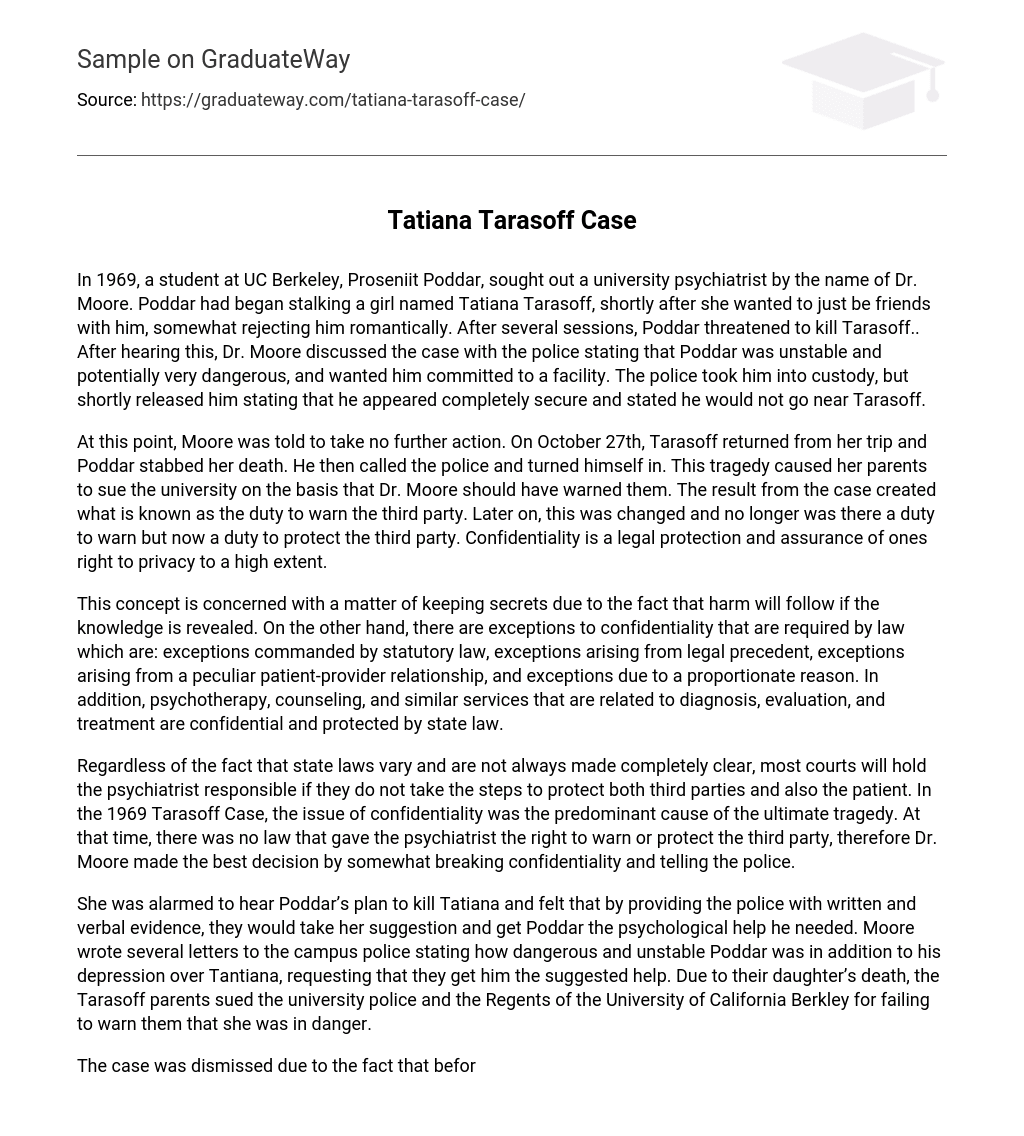In 1969, a student named Proseniit Poddar from UC Berkeley sought help from Dr. Moore, a university psychiatrist, due to his fixation on pursuing Tatiana Tarasoff romantically. Despite Tarasoff’s rejection, Poddar continued to obsess over her and eventually threatened to kill her during therapy sessions with Dr. Moore. Concerned about Poddar’s instability and potential danger, Dr. Moore reported the situation to the police and recommended that Poddar be committed to a mental health facility.
Poddar was apprehended by the police but was later released when they determined he appeared mentally stable and claimed he would not approach Tarasoff.
At this point, Moore was instructed to cease any further action. On October 27th, Tarasoff returned from her trip and Poddar fatally stabbed her. Subsequently, he contacted the police and surrendered himself. This tragic incident led her parents to file a lawsuit against the university, arguing that Dr. Moore should have alerted them. The outcome of the case established the concept now known as the duty to warn the third party. Over time, this obligation transformed into a duty to protect the third party. Confidentiality holds considerable legal significance as it ensures and guarantees one’s right to privacy.
The main concept here is the importance of keeping secrets because revealing certain knowledge can result in harm. However, there are legal exceptions to confidentiality which include: exceptions mandated by statutory law, exceptions based on legal precedent, exceptions arising from specific patient-provider relationships, and exceptions for a valid reason. Additionally, state laws provide protection and confidentiality for psychotherapy, counseling, and related services involving diagnosis, evaluation, and treatment.
While state laws may vary and be unclear, in most cases, psychiatrists are held responsible if they do not take steps to protect both the patient and others. In the 1969 Tarasoff Case, a lack of confidentiality laws played a major role in the unfortunate outcome. At that time, psychiatrists did not have legal authority to inform or safeguard third parties. Therefore, Dr. Moore made a justified decision by partially breaking confidentiality and informing the police.
When she found out about Poddar’s intention to harm Tatiana, she was surprised and concerned. She believed that if she could give the police both written and verbal evidence, they would consider her suggestion and make sure that Poddar got the necessary psychological help. Moore took the initiative to write several letters to the campus police, highlighting Poddar’s danger and instability, as well as his depression after Tatiana’s death. She asked the police to provide him with the recommended assistance. In response to their daughter’s tragic death, the Tarasoff parents sued both the university police and the Regents of the University of California Berkeley for negligence in not informing them about the potential danger she faced.
Prior to the Tarasoff case, doctors were only responsible for their patients and not third parties, resulting in the dismissal of this case. At that time, if Dr. Moore had contacted the Tarasoffs, he would have violated the law. Dr. Moore abided by the law by ensuring his patient’s safety through admission to a psychiatric facility, indirectly safeguarding Tantiana as well. Nevertheless, the police failed to adequately address Dr. Moore’s warning and should have assumed full responsibility for their inadequate performance.
If the police had paid attention to the doctor’s advice and sought help for Poddar, who desperately needed it, the outcome would have been completely different. The Tarasoff family continued to seek justice for Tantiana, even though it seemed unlikely at first. Initially, the court rejected the Tarasoffs’ case in a legal dispute, but they remained steadfast and later appealed to the California Supreme Court, which led to a reversal of the previous ruling.
The Tarasoff I case required therapists to notify individuals in danger from their patients. This led to the Tarasoff II case being brought against the police and university, but it was settled without going to trial. Poddar, the person responsible, was found guilty of manslaughter and served a four-year prison term before going back to India. It is believed that he is currently happily married.
Confidentiality is of utmost importance and should not be breached, unless under specific circumstances which were applicable to Poddar in this situation. Dr. Moore handled the matter discreetly, refraining from publicizing it or drawing attention to himself or Poddar. Instead, he engaged the police who should have conducted a thorough assessment of the situation. Furthermore, Moore consistently communicated his concerns with the university police through letters, genuinely believing that both Poddar and Tarasoff were in danger. Ultimately, his concerns proved to be justified.
Despite taking every possible step to prevent the situation, Moore cannot be held responsible for it. However, his efforts were hindered by confidentiality and other legal restrictions. It should have been acknowledged that notifying the police would not be a usual course of action given Poddar’s evident intention to cause harm. Therefore, under the law, Moore’s actions would be considered exceptional. Moreover, there were no specific laws similar to those existing today at that time. Consequently, doctors had to rely on their own judgment when making crucial decisions.
Dr. Moore, a medical professional, demonstrated his concern for others by taking proactive measures to safeguard their well-being. This included notifying the police and intervening to prevent a murder. Notably, it is crucial to highlight that during that period, the law solely concentrated on protecting patients without considering any involvement from external parties. Consequently, Dr. Moore exerted considerable efforts in aiding his patient in acquiring essential psychiatric assistance.
If Moore’s efforts had succeeded and the police had acted upon his claims, Poddar would have been treated in a facility to address and manage his issues effectively. This would have prevented the unchecked escalation of his depression, anger, and jealousy towards Tantiana. Instead of reassuring everyone that he was okay and promising to stay away from her, if the police had allowed this process, the outcome would have been entirely different. It is highly probable that Tantiana would still be alive today.





